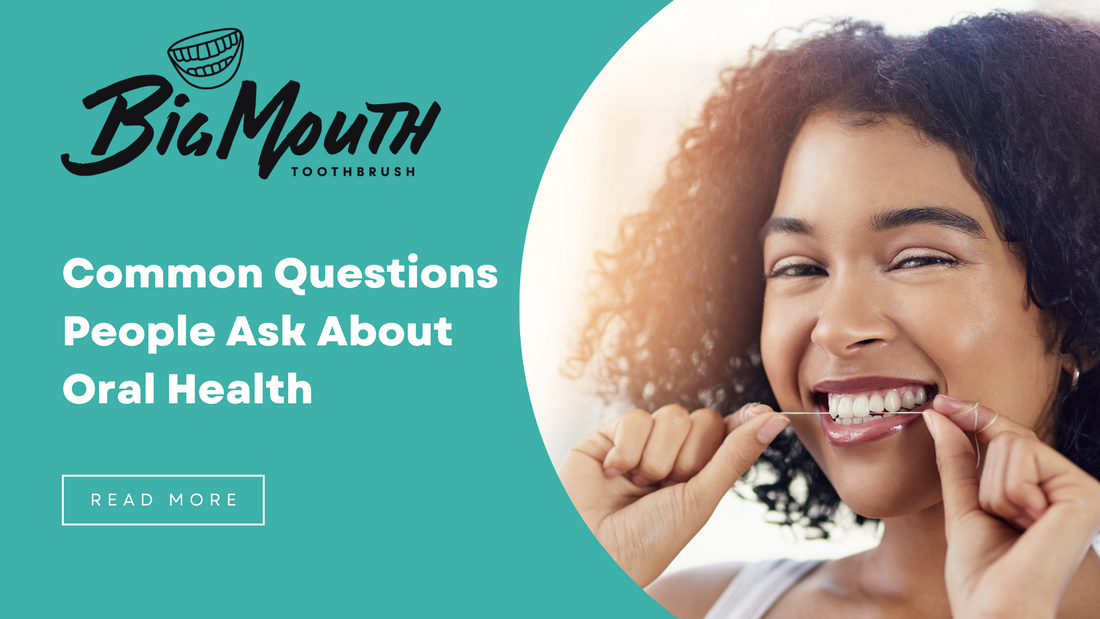Maintaining good oral health is crucial for overall well-being, yet many people have questions about the best practices and potential concerns. Here are some of the most common questions people ask about oral health, along with the answers to help guide you on your journey to a healthier smile.
- How often should I brush and floss my teeth?
Answer: You should brush your teeth at least twice a day—once in the morning and once before bed. Flossing should be done once a day to remove plaque and food particles between your teeth and below the gumline.
- What type of toothbrush should I use?
Answer: A soft-bristled toothbrush is generally recommended as it is effective in cleaning your teeth without damaging your gums or enamel. Electric toothbrushes can provide a more thorough cleaning and are a good option for many people.
- How often should I replace my toothbrush?
Answer: Replace your toothbrush every three to four months, or sooner if the bristles are frayed. A worn-out toothbrush won't clean your teeth effectively.
- Is mouthwash necessary for good oral hygiene?
Answer: While not a substitute for brushing and flossing, mouthwash can be a helpful addition to your oral hygiene routine. It can help kill bacteria, freshen breath, and provide fluoride to strengthen teeth.
- How can I prevent cavities?
Answer: Prevent cavities by brushing twice a day, flossing daily, using fluoride toothpaste, limiting sugary and acidic foods and drinks, and visiting your dentist regularly for check-ups and cleanings.
- What causes bad breath and how can I prevent it?
Answer: Bad breath can be caused by poor oral hygiene, certain foods, dry mouth, smoking, and medical conditions. Prevent it by maintaining good oral hygiene, staying hydrated, avoiding tobacco, and using mouthwash. Regular dental visits are also essential.
- How often should I visit the dentist?
Answer: You should visit your dentist at least twice a year for regular check-ups and cleanings. However, your dentist may recommend more frequent visits based on your specific oral health needs.
- Are electric toothbrushes better than manual ones?
Answer: Electric toothbrushes can be more effective at removing plaque and reducing gingivitis than manual toothbrushes. They are especially beneficial for people who may have difficulty brushing thoroughly with a manual brush.
- What is gum disease and how can I prevent it?
Answer: Gum disease, or periodontal disease, is an infection of the tissues that hold your teeth in place. It's typically caused by poor brushing and flossing habits. Prevent it by maintaining good oral hygiene, quitting smoking, and visiting your dentist regularly.
- What should I do if I have sensitive teeth?
Answer: Sensitive teeth can be managed by using toothpaste designed for sensitive teeth, avoiding acidic and sugary foods, and practicing good oral hygiene. If sensitivity persists, consult your dentist to rule out any underlying conditions.
- Is whitening toothpaste safe for my teeth?
Answer: Whitening toothpaste is generally safe, but overuse can sometimes lead to tooth sensitivity. It’s best to use it as directed and consult your dentist if you have concerns about tooth sensitivity or enamel wear.
- Can my diet affect my oral health?
Answer: Yes, your diet plays a significant role in your oral health. Consuming a balanced diet rich in fruits, vegetables, lean proteins, and dairy products helps keep your teeth and gums healthy. Limiting sugary and acidic foods and drinks can prevent tooth decay and erosion.
- How can I improve my oral health if I have braces?
Answer: Maintain good oral hygiene with braces by brushing after every meal, using an interdental brush or water flosser, and flossing daily with floss threaders. Regular dental check-ups are crucial to monitor your oral health during orthodontic treatment.
- Why are regular dental check-ups important?
Answer: Regular dental check-ups are vital for detecting problems early, preventing oral diseases, and maintaining overall dental health. Your dentist can identify issues you might not see or feel, such as cavities, gum disease, and oral cancer.
Conclusion
Understanding and addressing common oral health questions can help you maintain a healthy smile and prevent dental problems. If you have any specific concerns or additional questions, don’t hesitate to consult your dentist. Regular care and informed practices are the keys to achieving and maintaining excellent oral health.


